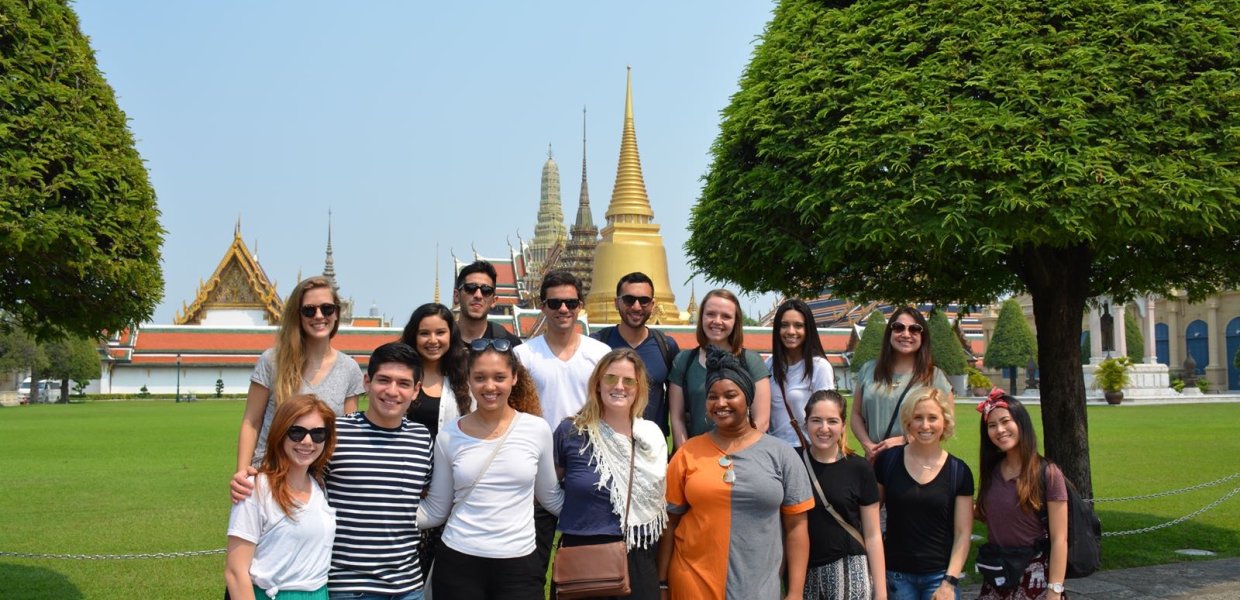In 2018, Annenberg International Programs took a group of students to Thailand for an alternative spring break trip in order to learn about corporate social responsibility (CSR) in the country. This program brought together students from various undergraduate and graduate programs in Annenberg programs, including two Master’s of Public Diplomacy students Brooke Adams ’19 and Kelechi Emetuche ’19. The USC students visited nonprofit organizations and corporations in both Bangkok and Chiang Mai focusing on engaging and empowering communities in Thailand and greater South East Asia.
Annenberg’s International Programs partnered with CISabroad to coordinate this trip. CISabroad provided two representatives that acted as translators, guides, and cultural educators. The CISabroad staff ensured to explain main tenants of Thai culture to the USC group upon arrival to mitigate potential unknowingly disrespectful actions, especially as relates to Buddhism (Buddhist practices and beliefs are ingrained in the culture, shaping norms and interaction in Thai society) and to allow students to be more open to cultural diplomacy.
One hands-on cultural exchange experience occurred at the Wat Chedi Luang temple. The temple supports an organization called “Monk Chat” which provides monks the opportunity to practice English with tourists. Squeezed close around a table, the USC students asked a monk questions about his life, such as the processes of choosing monasticism. While providing the monk the opportunity to practice English, USC students learned about the beliefs and practices of monasticism. The exchange provided valuable insights about Buddhist culture which shapes daily life in Thailand. As discussed in various conversations with CISabroad staff, Thai people are very peaceful, doing whatever it takes to dispel tension and avoid conflict requiring foreigners to be aware of the complicity Thai people will give in order to maintain harmony. Nonprofits in Thailand ensure to build relationships communities and those they are working with in order to establish open communication. This helps to mitigate the potential for locals to agree with everything a nonprofit says as an effort to be peaceful. Understanding cultural norms in Thailand and how it affects people’s actions is the first step to establishing successful programs in Thailand.
Each day, the USC students went on company visits including Internews, UNESCO, and USAID to learn about community engagement programs. Many of these organization talked about the importance of partnership to achieve goals. Students were able to learn first-hand from these presentations the importance of cultivating relationships with locals who are able to serve as implementers for programs. From a public diplomacy perspective, UNESCO is one example of an organization utilizing publics to further organizational aims. The UNESCO Bangkok staff has created youth policy workshops on the topic of inclusive and gender equal policy formation. UNESCO staff establish relationships with youth within the intelligentsia community, who then reach out to less urban or educated youth to be included in the policy workshops. Through this process, UNESCO is utilizing personal relationship to build a youth forum which becomes a space for exchange and collaboration between youth of various demographics. In this way, UNESCO programs around youth and a gender equal nation reflect the perspectives of Thai youth.
The USC group was given the opportunity to meet with Gulf Group, a large energy production company in Thailand. Students were given tours of Gulf rice farms cultivated adjacent to power plants in order to encourage community development in areas where power plants were introduced to previously vacant land. After a full day of learning about Gulf Group’s CSR efforts, the USC students were given the opportunity to present project proposals to some of Gulf Group’s senior staff on ideas to engage the community in areas where Gulf will be building new power plants. USC students incorporated social media and intergenerational programs in their presentations. Gulf Group leadership treated USC students with the utmost respect, eagerly utilizing the opportunity to learn from USC journalism, communication, and public diplomacy students.
USC students were gifted with planting trees at a Gulf Group rice farm. Each student was given a small tree, shovel, gloves, and some dirt to plant their tree in a grove of full grown trees. Gulf Group staff partnered with the students to help dig the hole and pack in the dirt. This activity summed up much of what the USC group cited as an important learning: building relationships provides the basis for understanding. In all CSR efforts, organizations prioritized building connections in communities to cultivate acceptance and integration of programs. Relationships built with CISabroad coordinators, Gulf Group staff, monks, and each other additionally enhanced student learning during Annenberg’s Thailand Alternative Breaks trip.
This post was written by Brooke Adams, who is a Master of Public Diplomacy candidate at the Annenberg School of Communications and holds a B.A. in English Literature from Azusa Pacific University. Brooke has participated in public health projects in South Africa and Uganda, leading her to pursue diplomacy for development of relationships between civil society and governments to strengthen public health and poverty alleviation efforts.
